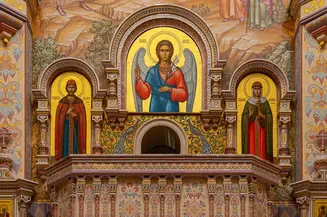The Last Supper According To The Bible
April 2023
Have you ever found yourself wondering about the true meaning behind the Last Supper, as depicted in the Bible? The Last Supper is an event that has been both revered and misunderstood for centuries, yet it continues to be a significant part of Christian faith and culture.
In this article, we will dive into the story of the Last Supper and its importance, explore its significance in a biblical context, and discuss how it is still relevant and commemorated today. By the end, you’ll have a deeper understanding of this sacred event and why it remains a vital part of Christian tradition.
Biblical Context of The Last Supper
The Last Supper is a pivotal event in the New Testament, marking Jesus’ final meal with his apostles before his crucifixion. It took place during the Jewish festival of Passover, which commemorates the liberation of the Israelites from slavery in Egypt (Exodus 12:14). Jesus and his disciples gathered in an upper room in Jerusalem to observe the traditional Passover meal, where they shared bread and wine (Matthew 26:17-29).
The Passover meal itself holds great significance, as it serves as a reminder of the Israelites’ deliverance from bondage and the protection of their firstborn by the blood of the sacrificial lamb. Jesus, often referred to as the “Lamb of God,” transformed the Passover meal by associating the bread and wine with his own body and blood, symbolizing a new deliverance for humanity through his sacrifice.
During this meal, Jesus revealed that one of the apostles would betray him, which led to the eventual arrest and crucifixion of Jesus (John 13:21-30). This betrayal was a fulfillment of Old Testament prophecies, such as Psalm 41:9 and Zechariah 11:12-13, which foretold the treachery of a close friend and the payment of thirty pieces of silver. The Last Supper is not only a somber reminder of Jesus’ suffering and sacrifice but also a testament to the love and unity he shared with his disciples.
Throughout the meal, Jesus used this occasion to teach his disciples about the Kingdom of God and to prepare them for his impending departure. He emphasized the importance of humility and service, which was exemplified by his act of washing the feet of his apostles (John 13:3-17). Furthermore, Jesus reassured his disciples that he would not abandon them, promising the coming of the Holy Spirit as their helper and advocate (John 14:15-18).
The Last Supper, thus, serves as a powerful reminder of Jesus’ deep love for his followers, his sacrificial act for the redemption of humanity, and his teachings that continue to guide believers in their spiritual journey.
The Significance of The Last Supper
The Last Supper holds great significance in the biblical context, as it symbolizes the establishment of a new covenant between God and humanity. Jesus used the bread and wine to represent his body and blood, which would be sacrificed for the forgiveness of sins (Matthew 26:26-28). This act of self-sacrifice and love is the foundation of the Christian faith and forms the basis for the doctrine of atonement, which posits that Jesus’ death on the cross reconciles humanity with God by paying the debt of sin.
In addition, the Last Supper is an essential part of Christian tradition as it instituted the sacrament of the Eucharist, also known as Holy Communion. This ritual continues to be practiced in churches today, allowing Christians to participate in the spiritual nourishment and unity that Jesus shared with his apostles. By partaking in the Eucharist, believers are reminded of their connection to Christ and his teachings, reinforcing their commitment to living out the Christian faith.
The Last Supper also serves as a reminder of Jesus’ teachings on love, forgiveness, and service. By washing the feet of his disciples, Jesus demonstrated the importance of humility and selflessness in serving others (John 13:3-17). This act challenges believers to adopt a servant-leader mindset, focusing on the needs of others rather than seeking personal gain or recognition.
Furthermore, the Last Supper highlights the importance of fellowship and unity within the Christian community. As Jesus shared a meal with his disciples, he emphasized the value of coming together to share their experiences, support one another, and grow in their faith. The communal aspect of the Eucharist continues to be an essential aspect of Christian worship, fostering a sense of belonging and encouraging believers to live out their faith in community.
In essence, the significance of the Last Supper extends beyond the historical event itself, serving as a powerful reminder of Jesus’ sacrificial love, the transformative power of his teachings, and the importance of community in the Christian faith. The Last Supper continues to inspire and challenge believers today, encouraging them to live lives marked by love, service, and unity.
Most Important Details of The Last Supper
- The First Communion: Jesus broke bread and shared wine with his disciples, establishing the sacrament of Holy Communion (Luke 22:19-20). This act symbolizes the breaking of Jesus’ body and the shedding of his blood for the forgiveness of sins.
- The Washing of the Feet: In a demonstration of humility and service, Jesus washed the feet of his disciples, teaching them the importance of serving one another (John 13:3-17).
- The Betrayal: Jesus revealed that one of his disciples would betray him, leading to his eventual arrest and crucifixion (Matthew 26:20-25).
- The New Commandment: Jesus gave his disciples a new commandment to love one another as he had loved them (John 13:34-35). This commandment continues to guide Christians in their relationships with others.
Bible Verses Related To The Last Supper
Matthew 26:26-28 – “Now as they were eating, Jesus took bread, and after blessing it broke it and gave it to the disciples, and said, ‘Take, eat; this is my body.’ And he took a cup, and when he had given thanks he gave it to them, saying, ‘Drink of it, all of you, for this is my blood of the covenant, which is poured out for many for the forgiveness of sins.'”
Mark 14:22-24 – “And as they were eating, he took bread, and after blessing it broke it and gave it to them, and said, ‘Take; this is my body.’ And he took a cup, and when he had given thanks he gave it to them, and they all drank of it. And he said to them, ‘This is my blood of the covenant, which is poured out for many.'”
Luke 22:19-20 – “And he took bread, and when he had given thanks, he broke it and gave it to them, saying, ‘This is my body, which is given for you. Do this in remembrance of me.’ And likewise the cup after they had eaten, saying, ‘This cup that is poured out for you is the new covenant in my blood.'”
John 13:4-5 – “Rose from supper. He laid aside his outer garments, and taking a towel, tied it around his waist. Then he poured water into a basin and began to wash the disciples’ feet and to wipe them with the towel that was wrapped around him.”
John 13:14-15 – “If I then, your Lord and Teacher, have washed your feet, you also ought to wash one another’s feet. For I have given you an example, that you also should do just as I have done to you.”
1 Corinthians 11:23-25 – “For I received from the Lord what I also delivered to you, that the Lord Jesus on the night when he was betrayed took bread, and when he had given thanks, he broke it, and said, ‘This is my body, which is for you. Do this in remembrance of me.’ In the same way also he took the cup, after supper, saying, ‘This cup is the new covenant in my blood. Do this, as often as you drink it, in remembrance of me.'”
Matthew 26:21 – “And as they were eating, he said, ‘Truly, I say to you, one of you will betray me.'”
Luke 22:27 – “For who is the greater, one who reclines at table or one who serves? Is it not the one who reclines at table? But I am among you as the one who serves.”
John 13:34-35 – “A new commandment I give to you, that you love one another: just as I have loved you, you also are to love one another. By this all people will know that you are my disciples, if you have love for one another.”
Matthew 26:30 – “And when they had sung a hymn, they went out to the Mount of Olives.
The Last Supper’s Commemoration Today
The Last Supper continues to be commemorated by Christians around the world, particularly during Holy Week, which leads up to Easter Sunday. Maundy Thursday, also known as Holy Thursday, specifically honors the Last Supper and the washing of the feet. Many churches hold special services that include a reenactment of the washing of the feet, emphasizing the importance of humility and service.
The Eucharist, or Holy Communion, remains a central part of Christian worship, providing a tangible connection to the Last Supper and the sacrifice Jesus made for humanity. During Communion, Christians partake of bread and wine (or grape juice) in remembrance of Jesus’ body and blood, reaffirming their commitment to Christ and their unity with fellow believers.
Artists and theologians have also found inspiration in the Last Supper, creating beautiful works of art, music, and literature that explore the profound themes of sacrifice, love, and redemption. One of the most famous depictions of the Last Supper is the painting by Leonardo da Vinci, which continues to captivate audiences with its powerful portrayal of Jesus and his disciples.
Final Thoughts
The Last Supper is an event of immense importance in the Christian faith, as it demonstrates Jesus’ love and sacrifice for humanity. Through the institution of the Eucharist and the washing of the feet, Jesus taught his disciples the value of humility, service, and unity. The Last Supper remains a vital part of Christian worship and tradition, providing a powerful reminder of the spiritual nourishment and connection that can be found in Christ.
As Christians continue to commemorate the Last Supper through Holy Communion and acts of service, they also honor the timeless message of love, sacrifice, and redemption that lies at the heart of their faith. By understanding the significance of the Last Supper, we can gain a deeper appreciation for the transformative power of Jesus‘ teachings and the enduring relevance of this sacred event in our lives today.
In this article:





